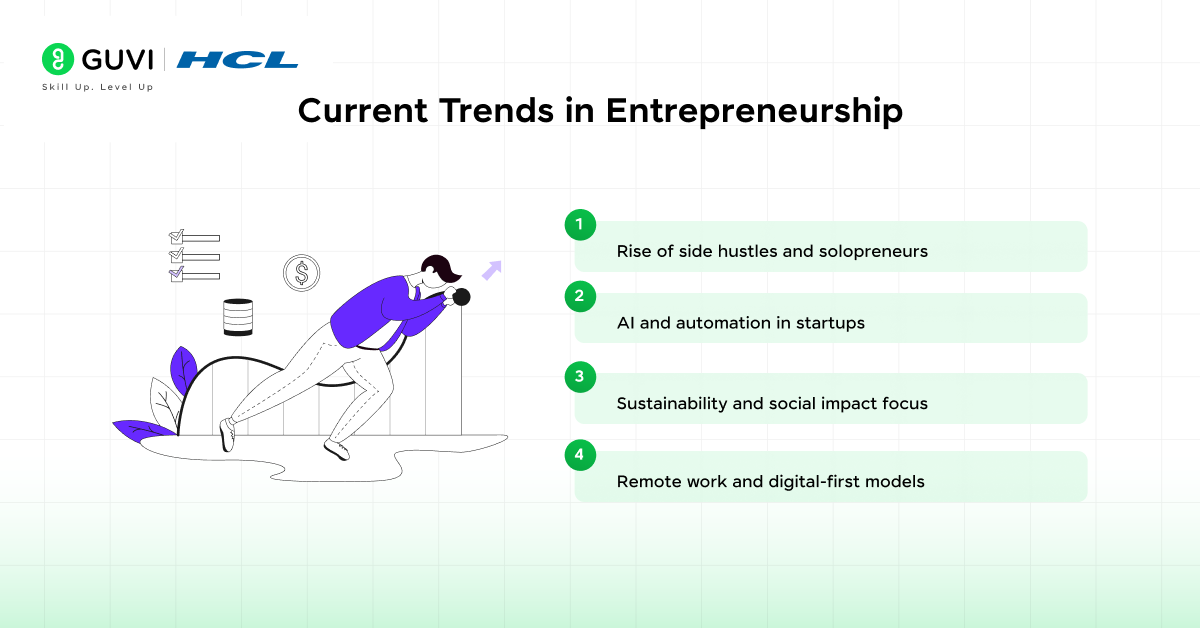
What is the Scope of Entrepreneurship in 2025? An Exclusive Guide
Oct 08, 2025 5 Min Read 2826 Views
(Last Updated)
The scope of entrepreneurship is expanding rapidly, with the sheer number of people considering starting a new business in 2025. You might be surprised to learn that the median cost to start a business is just $5,000, and nearly 40% of business owners launched their ventures with less than $1,000.
Despite economic concerns like inflation, 72% of current business owners plan to invest in growing their operations in the coming year, highlighting a strong confidence in entrepreneurial opportunities, which is the cause of all this buzz that has brought you here.
The importance of entrepreneurship extends beyond individual success, serving as a key driver of economic growth, innovation, and job creation. Whether you’re interested in digital entrepreneurship, sustainable business models, or traditional ventures, this guide will help you understand what opportunities await in 2025. Let’s begin!
Table of contents
- What is Entrepreneurship and Why It Matters
- Types of Entrepreneurship
- 1) Small business entrepreneurship
- 2) Scalable startup entrepreneurship
- 3) Social and green entrepreneurship
- 4) Corporate and intrapreneurship
- 5) Technological and digital entrepreneurship
- Scope of Entrepreneurship Across Sectors
- 1) Scope of entrepreneurship in India
- 2) Scope of entrepreneurship development in rural areas
- 3) Scope of digital entrepreneurship
- 4) Global vs local opportunities
- Current Trends in Entrepreneurship
- 1) Rise of side hustles and solopreneurs
- 2) AI and automation in startups
- 3) Sustainability and social impact focus
- 4) Remote work and digital-first models
- Concluding Thoughts…
- FAQs
- Q1. What are the main types of entrepreneurship expected to thrive in 2025?
- Q2. How is digital technology impacting entrepreneurship?
- Q3. What are the key challenges facing entrepreneurs in 2025?
- Q4. How important is social impact in modern entrepreneurship?
- Q5. What opportunities exist for rural entrepreneurship?
What is Entrepreneurship and Why It Matters
Entrepreneurship originates from the French verb “entreprendre,” meaning “to undertake”. It refers to the process of creating, organizing, and managing a business venture along with its associated risks to generate profit.

The core concept goes beyond simply starting a business. Entrepreneurship involves:
- Identifying opportunities where others see challenges
- Combining resources (land, labor, capital) in innovative ways
- Assuming calculated risks to bring ideas to market
- Creating value through products or services that solve problems
An entrepreneur is someone with the ability and determination to establish, manage, and grow a startup venture while accepting the inherent risks involved. Economists have long recognized entrepreneurship as integral to production, alongside land, labor, and capital.
Types of Entrepreneurship
In 2025, entrepreneurship has evolved into diverse paths, each with unique characteristics and goals. As the business landscape shifts, understanding these different types helps you identify which entrepreneurial route best matches your skills and aspirations.

1) Small business entrepreneurship
Small business entrepreneurship focuses on creating local enterprises that serve community needs without necessarily aiming for massive expansion. These businesses typically start with modest funding, often self-financing, small loans, or family support. Small business entrepreneurs prioritize independence and building sustainable local operations rather than rapid growth.
2) Scalable startup entrepreneurship
Scalable startup entrepreneurship aims for rapid expansion and significant market disruption. Unlike small businesses, these ventures are designed for explosive growth from day one.
What sets scalable startups apart:
- Innovative products or services with large market potential
- Business models that can grow exponentially with minimal cost increases
- Reliance on external funding from venture capital or investors
- Global aspirations rather than local focus
3) Social and green entrepreneurship
Social and green entrepreneurship prioritizes addressing environmental and social challenges while maintaining financial viability. This entrepreneurial approach has gained momentum as consumers increasingly value sustainable and ethical business practices.
In 2025, we’re seeing more young entrepreneurs build businesses that deliver “profit with purpose,” playing a vital role in creating a more equitable and sustainable world.
4) Corporate and intrapreneurship
Intrapreneurship allows innovation within established organizations, enabling employees to think entrepreneurially without the risks of independent ventures. This approach helps large companies stay competitive and agile.
Successful examples include:
- Gmail—developed during Google’s “20% time” policy, now with over 1.8 billion users
- Post-It Notes—created within 3M when scientists Spencer Silver and Art Fry collaborated on an internal project
- PlayStation initially faced resistance within Sony before becoming one of the company’s most profitable business lines
5) Technological and digital entrepreneurship
Digital entrepreneurship leverages technology to create new business models with global reach. This category has seen tremendous growth as digital technologies transform how entrepreneurs build and scale businesses.
In 2025, digital entrepreneurship includes:
- Online platforms that benefit from network effects
- Businesses using artificial intelligence, blockchain, and other emerging technologies
- Location-independent ventures with worldwide customer bases
- Enterprises with lower startup costs but rapid scalability
For aspiring entrepreneurs, these diverse paths offer multiple entry points into business ownership, each with distinct advantages depending on your goals, resources, and risk tolerance.
Scope of Entrepreneurship Across Sectors
Entrepreneurship continues to reshape economies worldwide as we head into 2025, with remarkable growth across various sectors. Let’s explore how entrepreneurial opportunities are developing across different contexts and supporting the ever-increasing scope of entrepreneurship.

1) Scope of entrepreneurship in India
India’s startup ecosystem has emerged as a global powerhouse, ranking third worldwide with more than 100 unicorns, firmly stating its growing scope of entrepreneurship. This growth stems from several key factors:
- Robust support from incubators and accelerators
- Increased venture capital funding is accelerating ecosystem growth
- Government initiatives like ‘Startup India’ offer tax benefits and funding access
- A diverse market with a growing middle class creates favorable grounds for innovation
The Indian entrepreneurial landscape has transformed dramatically since the Economic Policy Reform of 1991, which allowed private banks to operate freely and attracted foreign investment. Major sectors driving this boom include fintech, edtech, e-commerce, healthtech, and agritech, with innovative hubs developing in Bangalore, Delhi NCR, and Mumbai.
2) Scope of entrepreneurship development in rural areas
Rural entrepreneurship represents a vital opportunity for economic development, though it faces unique challenges. Despite a decline in new business starts over the past decade, entrepreneurship remains the best chance for rural economies to grow further, citing the ever-increasing scope of entrepreneurship.
Business Programs from organizations like the USDA provide financial backing and technical assistance through:
- Rural Business Development Grants for small businesses with fewer than 50 workers
- Rural Cooperative Development Grants to improve economic conditions
- Zero-interest loans to local businesses that create and retain employment
3) Scope of digital entrepreneurship
The digital economy has more than doubled since 2020, supporting 28.4 million jobs and rapidly expanding the scope of entrepreneurship. Digital entrepreneurship encompasses:
- Value creation activities in both existing and new industries
- Commercial applications of digital technology knowledge
- Diverse fields including IoT, data security, cloud platforms, and smart solutions
Six primary areas have emerged in this sector: digital entrepreneurship in academia, women entrepreneurship, innovation ecosystems, government policy, social entrepreneurship, and startup incubation.
4) Global vs local opportunities
Today’s entrepreneurs face a critical choice between targeting global markets or focusing locally. Each approach offers distinct advantages:
Global expansion benefits:
- Greater revenue potential through access to millions more customers
- Economic diversification that buffers against regional recessions
- Expanded markets for niche products that may be more appreciated overseas
Local focus advantages:
- A deeper understanding of community needs
- Reduced complexity from international regulations and shipping challenges
- Stronger relationship networks and community support
Many successful businesses adopt a hybrid approach, establishing a strong local foundation before expanding globally in stages. The decision ultimately depends on your product type, target audience, and long-term business goals.
Current Trends in Entrepreneurship
Today’s entrepreneurial landscape is rapidly evolving with innovative approaches to business creation and operation, thus constantly expanding the scope of entrepreneurship. Let’s explore four major trends reshaping entrepreneurship in 2025.

1) Rise of side hustles and solopreneurs
The entrepreneurial journey now often begins with side projects alongside traditional employment. According to recent data, 39% of American adults report having a side hustle. This trend is even more pronounced among millennials, with 50% pursuing supplementary income streams.
Side hustles typically generate around ₹48,000 monthly on average, with 16% bringing in more than ₹96,000 monthly. For many, these ventures serve as low-risk gateways to full entrepreneurship, allowing skill development and market testing without immediately abandoning financial security.
2) AI and automation in startups
Artificial intelligence has become essential for entrepreneurs to overcome common startup challenges. Currently, 90% of small to medium-sized businesses utilize AI to automate customer interactions. This technology helps new ventures compete with larger companies despite limited resources.
AI enables startups to:
- Predict sales trends and allocate resources effectively
- Automate repetitive tasks like data entry
- Provide 24/7 customer support through chatbots
Most small businesses now use AI to personalize customer journeys across channels, demonstrating how this technology levels the competitive playing field.
3) Sustainability and social impact focus
Social entrepreneurship continues to gain momentum as entrepreneurs increasingly build businesses addressing environmental and societal challenges. This approach combines entrepreneurial principles with a mission to create positive change.
Key social entrepreneurship themes include value creation, smart partnerships, and social innovation. The COVID-19 pandemic further highlighted the importance of social enterprises in recovery efforts, with sustainability becoming central to business models rather than an afterthought.
4) Remote work and digital-first models
Digital-first business approaches have transformed entrepreneurship fundamentals. Approximately 71% of small businesses report that adopting digital tools helped them survive economic challenges.
This shift offers several advantages:
- Cost savings through reduced physical infrastructure
- Access to global talent pools without geographic limitations
- Improved work-life balance and employee satisfaction
Moreover, companies with remote work options experience 25% lower employee turnover, making digital-first models increasingly attractive for startups with limited resources.
Want to turn your business idea into a real business? HCL GUVI’s Entrepreneurship Course equips you with practical strategies in product-market fit, digital branding, and startup fundraising—perfect for aspiring digital entrepreneurs ready to launch in 2025.
Concluding Thoughts…
Entrepreneurship stands at a remarkable crossroads in 2025. Throughout this guide, you’ve seen how the entrepreneurial landscape offers diverse pathways—from small businesses serving local communities to scalable startups disrupting global markets, hence the scope of entrepreneurship is truly vast and global.
What makes entrepreneurship particularly promising for 2025? First and foremost, the digital revolution has created unprecedented opportunities across sectors. Your entrepreneurial journey might begin as a side project or launch directly as a full-time pursuit.
Regardless of your chosen path, successful entrepreneurs share common traits—resilience during uncertainty, adaptability to changing markets, and vision for creating value. The question no longer seems to be whether entrepreneurship will thrive in 2025, but rather which opportunities you will seize in this expanding frontier of possibilities.
FAQs
Q1. What are the main types of entrepreneurship expected to thrive in 2025?
The main types of entrepreneurship expected to flourish in 2025 include small business entrepreneurship, scalable startup entrepreneurship, social and green entrepreneurship, corporate intrapreneurship, and technological and digital entrepreneurship. Each type offers unique opportunities and challenges for aspiring entrepreneurs.
Q2. How is digital technology impacting entrepreneurship?
Digital technology is transforming entrepreneurship by enabling new business models, reducing startup costs, and allowing for global reach. It has led to the rise of digital-first businesses, with 71% of small businesses now operating online to some degree. AI and automation are also playing crucial roles in helping startups compete with larger companies.
Q3. What are the key challenges facing entrepreneurs in 2025?
Major challenges for entrepreneurs in 2025 include access to funding, with 51% of small business owners finding interest rates too high for loans. Economic uncertainty, inflation, and the need for financial resilience are also significant hurdles. However, government support and alternative funding sources are available to help overcome these challenges.
Q4. How important is social impact in modern entrepreneurship?
Social impact has become increasingly important in modern entrepreneurship. Many young entrepreneurs are building businesses that deliver “profit with purpose,” focusing on solving environmental and social challenges while maintaining financial viability. This trend is expected to continue growing as consumers increasingly value sustainable and ethical business practices.
Q5. What opportunities exist for rural entrepreneurship?
Rural entrepreneurship presents significant opportunities for economic development. Various programs, such as the USDA’s Rural Business Development Grants, provide financial backing and technical assistance to rural entrepreneurs. Success stories like Ord, Nebraska, demonstrate how investing in rural entrepreneurship ecosystems can lead to job creation and community revitalization.




































Did you enjoy this article?